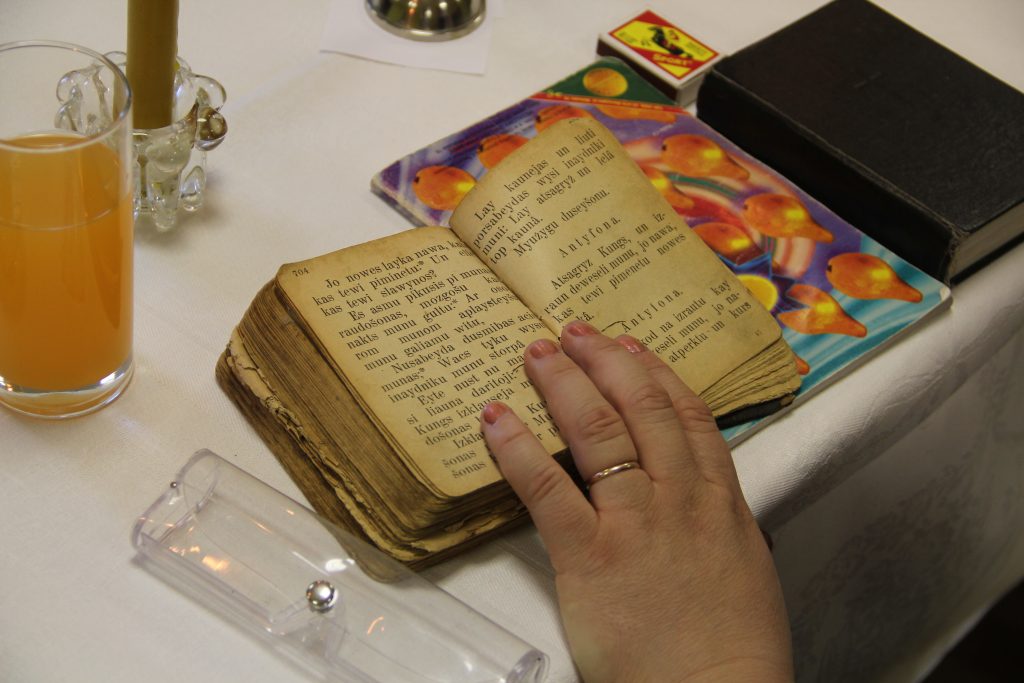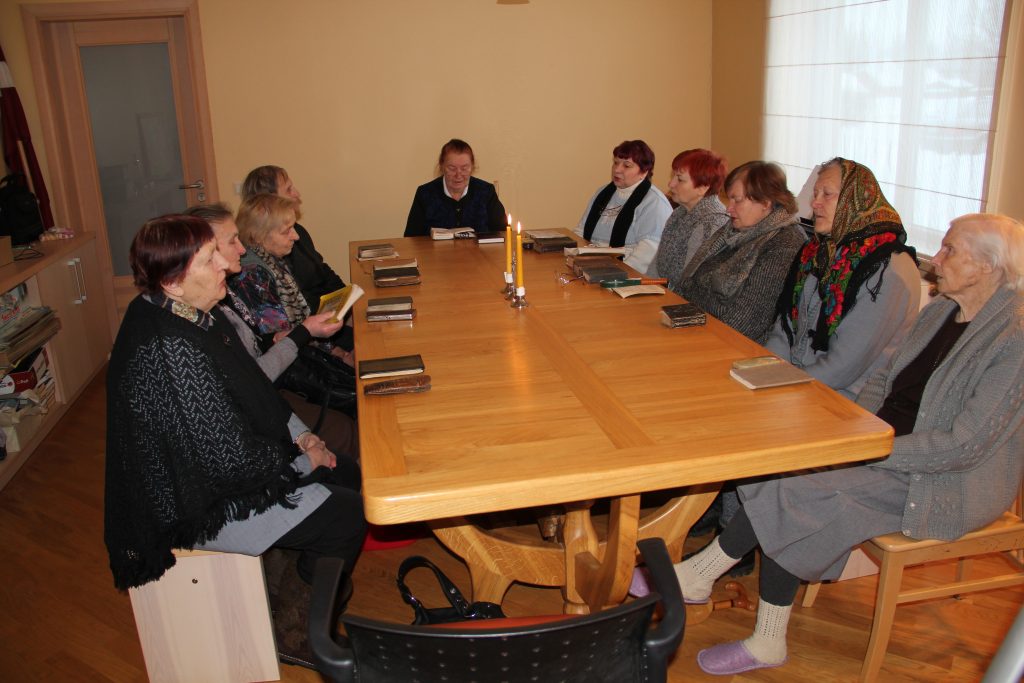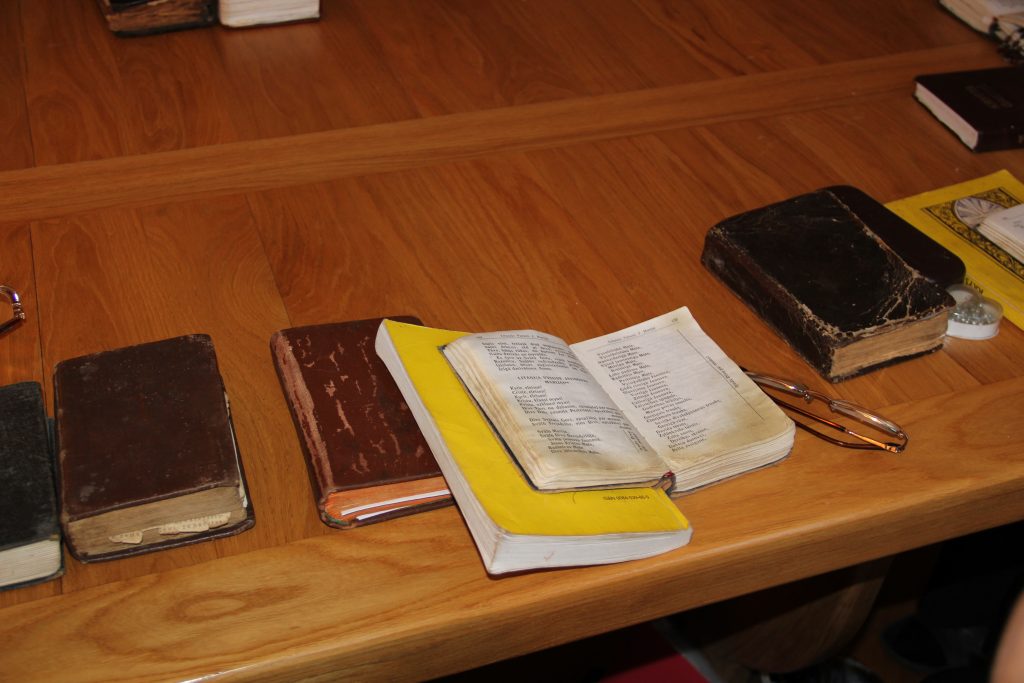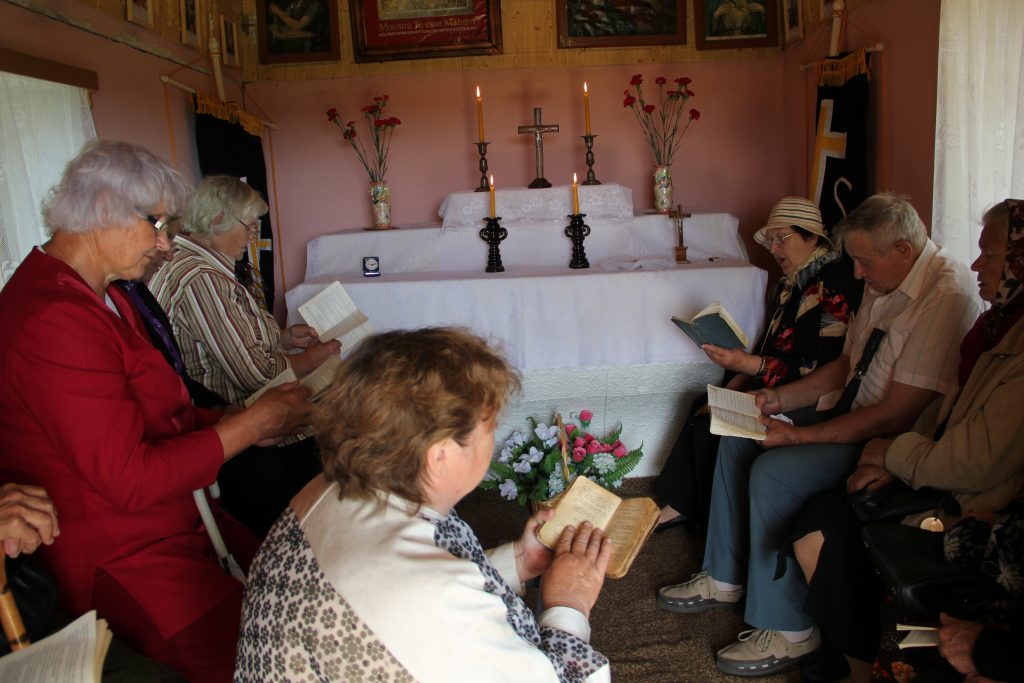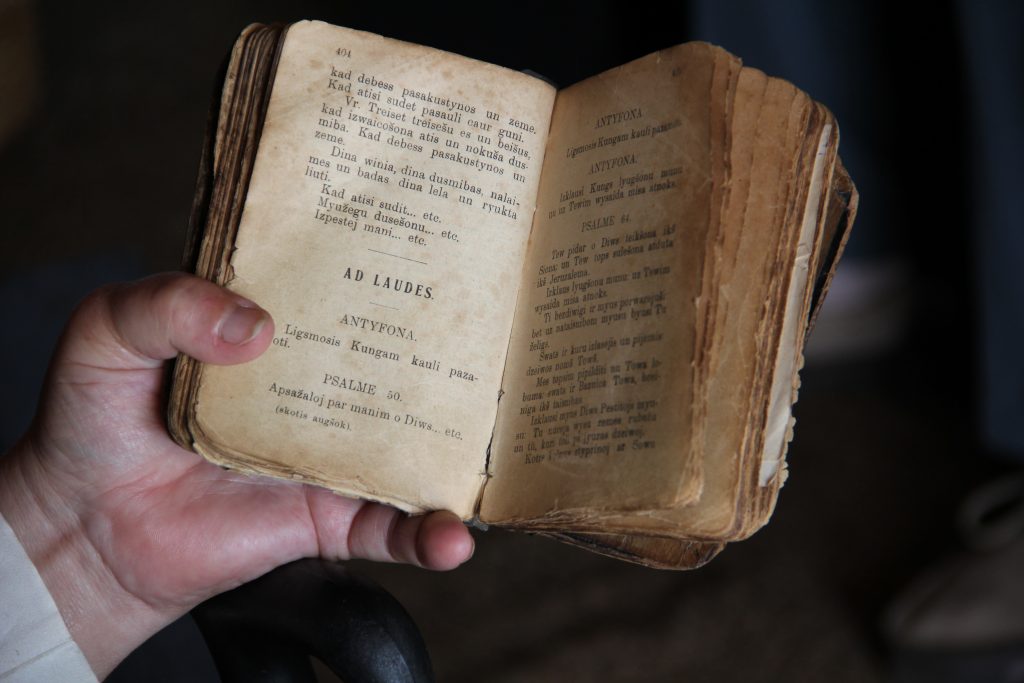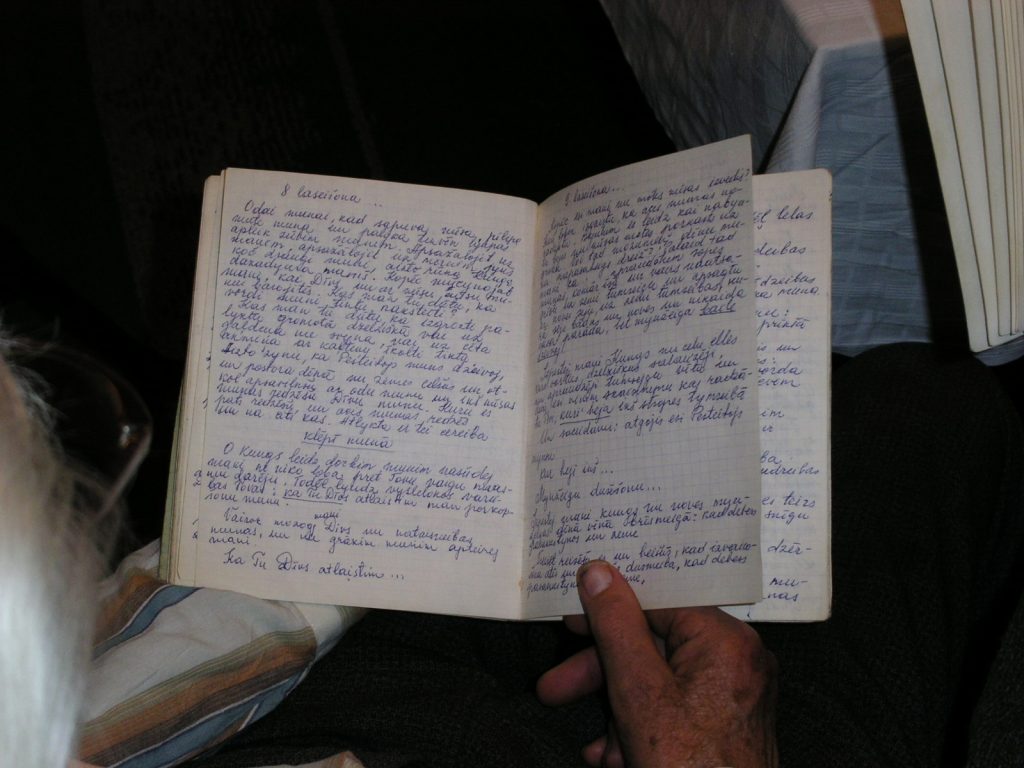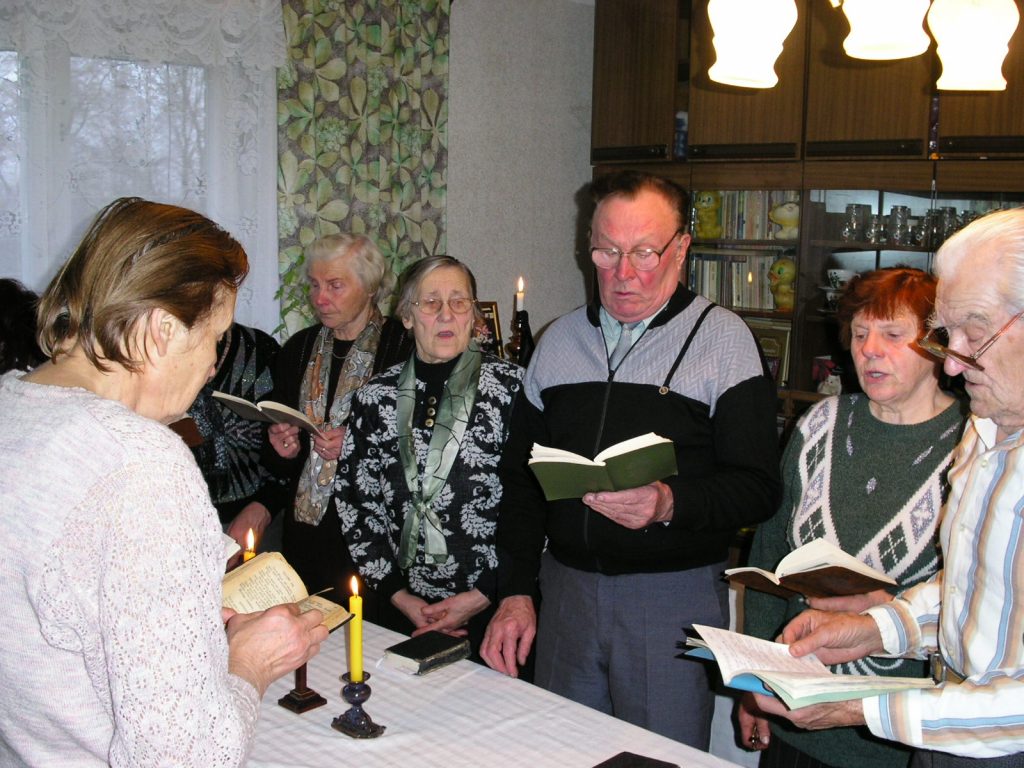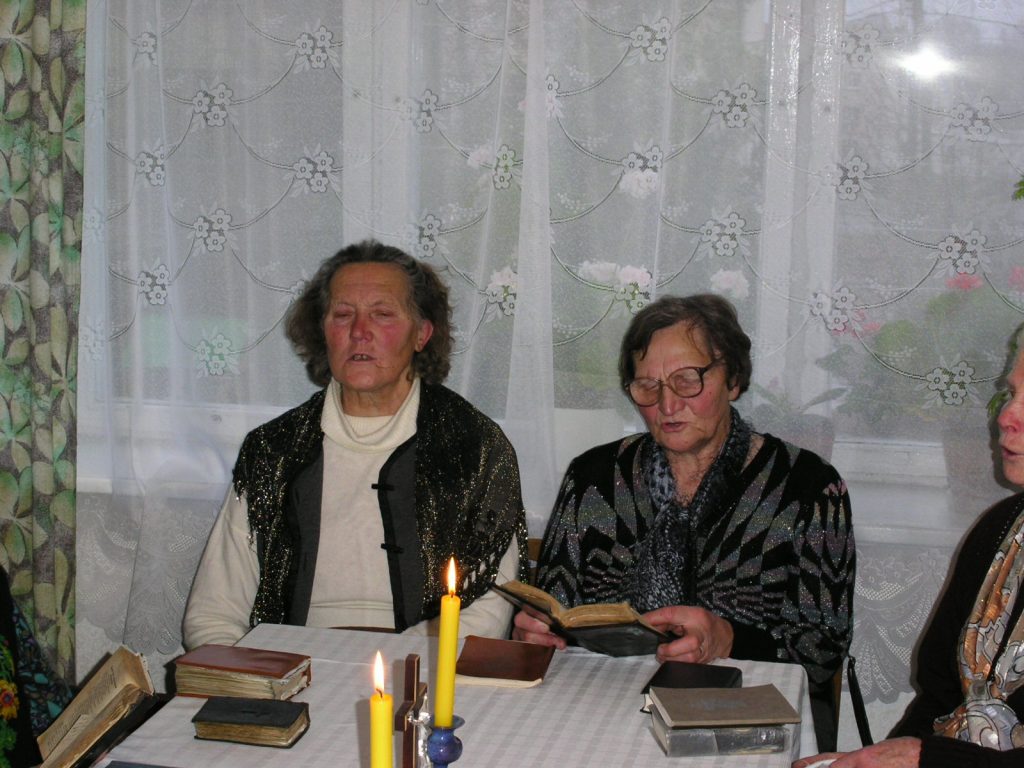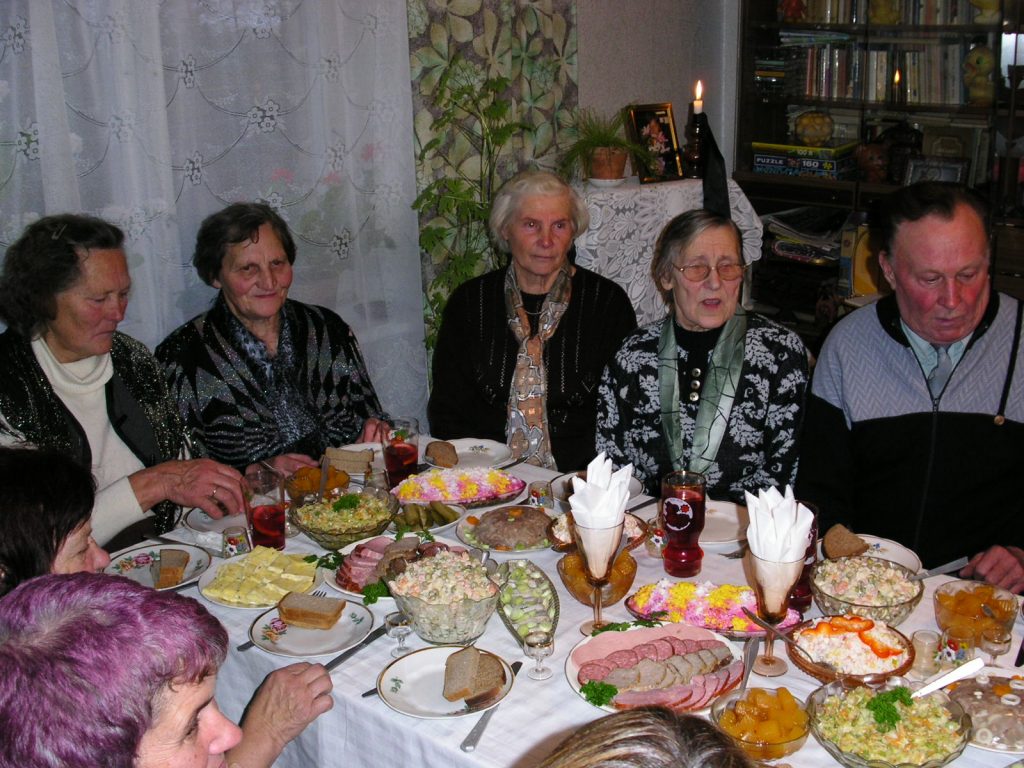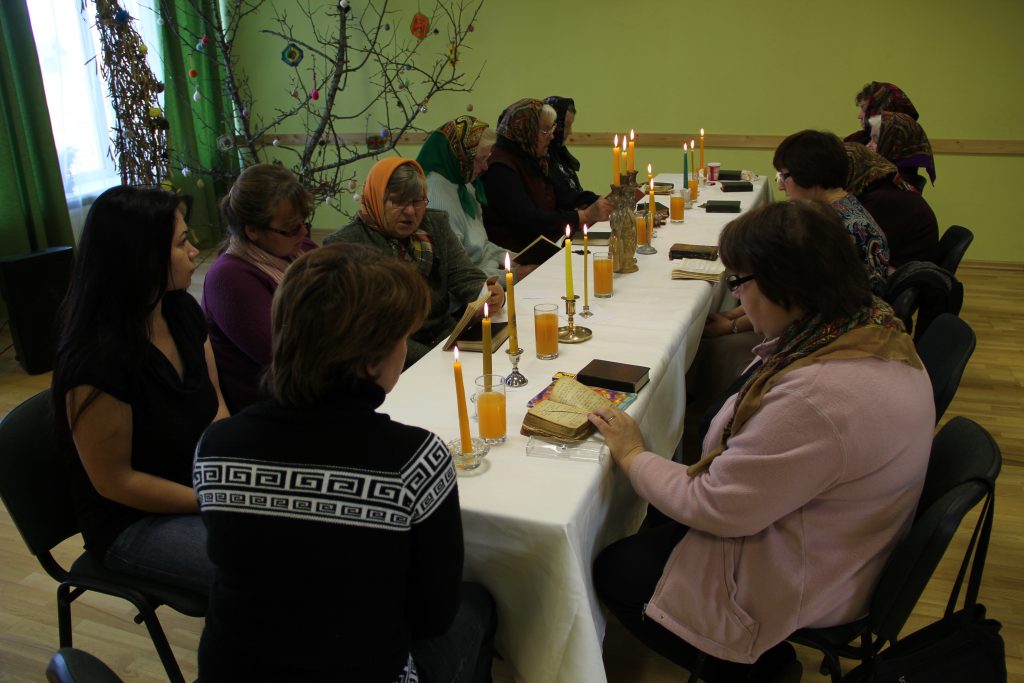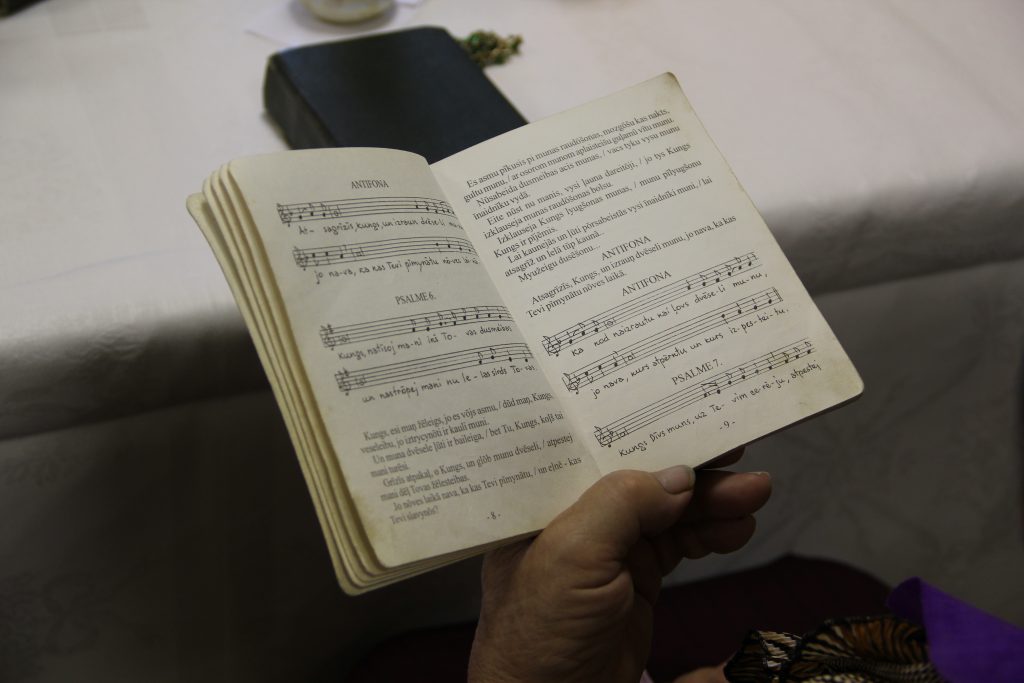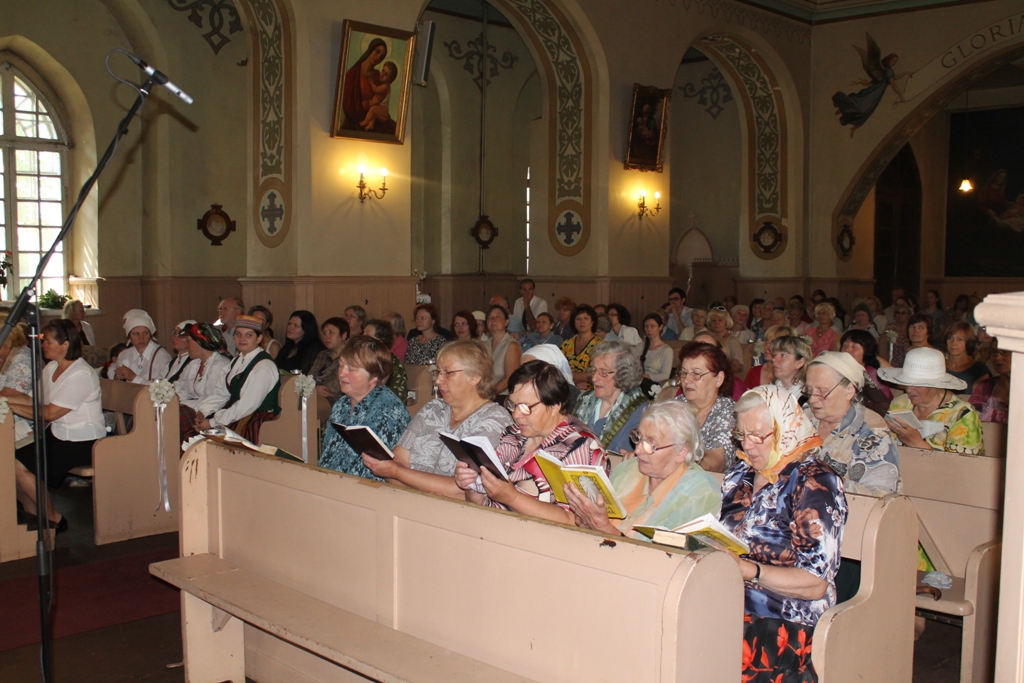Author:
Anda Beitane, Ruta Cibule
Oral traditions and their expressions, including language as a vehicle of intangible cultural heritage
Title
Psalm singing in Northern Latgale (2017)
Psaļmu (saļmu) dzīduošona Zīmeļlatgolā (2017)
Geography
This tradition is prevalent in Northern Latgale: in the regions of Balvi, Baltinava, Rugāji, and Viļaka. It can be found throughout Latgale with varying degrees of intensity and local variation.
In each of the 19 parishes of Northern Latgale and the towns of Balvi and Viļaka, at least one singing group practices psalm singing in the 21st century.
Significance of the pirts tradition in community life
In Northern Latgale, where the majority of the population is Catholic, alongside the music practiced in church rituals, there are also singing traditions unrelated to church activities and practiced even without priests. One of these traditions is psaļmu (saļmu) dzīduošona, which are prayers for the deceased that have been orally transmitted for at least one and a half centuries.
Activities
Approximately one and a half to two hours of prayer, performed mainly at home. The singing is from the church's prayer books, where only the text is published. The melody and the way of singing are inherited from generation to generation, and that is, of course, singing “no galvas” (from memory).
The most experienced singers often also perform the text from memory, despite its large volume, but the songbooks are still kept in front of them because tradition requires it.
The beginning of the research of this unique phenomenon in Latvian ethnomusicology can be considered the recording of psalm singing in Northern Latgale, which was made by Anda Beitāne in 1995 in Upīte, Šķilbēni parish to include it in an anthology of Latvian traditional music.
This was followed by a systematic work of documentation and research, which was started immediately after and is still being continued by Mārtiņš Boiko. He uses the Latin name “Officium Defunctorum” for the designation of this tradition, describes it as prayers usually held by the clergy in Latin, and admits that it is surprising to find it in the traditional repertoire of the people of Eastern Latvia in their native language since the end of the 18th century as partially orally inherited, a folklorized phenomenon, similarly to a folk song – without any external organization (Boiko 2012: 14).
Singing psalms for the dead has a very important place in the repertoire of the traditional music of Northern Latgale. As Boiko writes, “Tas ir kaut kas, kas pieder pie mājas dzīves. Tāpat kā nāve pati” (It is something that belongs to domestic life. Like death itself) (Boiko 2012: 14). Presumably, this is why this tradition is still alive in many places today. It can have multiple contexts. One of them is the time before the funeral, while the deceased is still at home – in an adjacent room or outbuilding. At this time, usually in the evenings, psalms are sung.
Another context is the so-called “anniversary”, the day a year has passed since the relative's death and the “memorial prayer” that is held every year for everyone that has passed in the family. Once a year, Saļmas can also be heard at the church – on All Souls' Day – November 2, and at the graveyard during the Cemetery Festival. (Boiko 2012: 15-16).
Beliefs, rituals, and unwritten rules
At home, psalm-singing usually takes place in the living room at a table covered with a white linen tablecloth. The table has lit candles and a crucifix, often, next to them there are also symbols of home blessing – rye bread and salt.
The singing is initiated and led by the main singer or front singer, who the other singers join. In several cases, there are two groups of singers and two front singers.
On such occasions, the two groups sing alternately. The number of singers tends to vary, but most often, one group of singers consists of five or six singers. The way the psalms are sung can be described as very powerful. Singers have repeatedly admitted that it requires a lot of strength.
Inheritance and transmission
The melody and the way of singing are inherited from generation to generation, and, therefore, that means singing from memory. The most experienced singers often also perform the text from memory, despite its large volume, but the songbooks are still kept in front of them as tradition requires.
History
Mārtiņš Boiko connects the introduction and consolidation of the psalm-singing tradition in Latgale with the activities of the Jesuits. He dates the beginning of its spread to the publication of the prayer book “Nabożeństwo ku czci y chwale Boga w Trójcy Swiętey Jedynego” [Prayer Book to the Glory of the Triune God] in 1771. It is a book compiled by Jesuits in which prayers, songs, and religious instructions are published in the Latgalian language (Boiko 2012: 16).
Ontons Slišāns – a prominent cultural worker of Northern Latgale and an activist of traditional culture, who in 1971, in cooperation with Miķelis Jermacāns – Father Jēkabs of the Capuchins – made the first arrangements for singing psalms in Northern Latgale – writes about psalm singing in Upīte as follows: “Šobrīd visstabilākā no garīgo dziesmu dziedāšanas tradīcijām ir saļmu dziedāšana sētā, arī kapsētās. Kaut arī padomju gados, 20. gadsimta otrajā pusē, saļmu dziedāšanas tradīcija sāka apsīkt, tā tomēr ir izturējusi laika pārbaudi un šobrīd ir būtiska nepieciešamība gandrīz katras ģimenes aizgājēju pieminēšanas un godināšanas sakrālajās tradīcijās (… ) Vēl 20. gadsimta vidū katrā lielajā ciemā darbojās saļmu dziedātāju kopas, bet mazajos ciemos tās tika veidotas, kopā sanākot saļmu teicējām no vairākiem ciemiem. (…) Kad vairums sievu no saļmu dziedātāju kopām aizgāja mūžībā, saļmu dziedāšanas tradīcijas saglabāšanu pārņēma Upītes etnogrāfiskā ansambļa sievas, piesaistot dziedāšanas reizēs vēl dzīvās bijušo kopu saļmu dziedātājas” (Currently, the most stable of the traditions of singing spiritual songs is the singing of psalms at the homestead, also at cemeteries. Although during the Soviet years, in the second half of the 20th century, the tradition of psalm singing began to decline, it has withstood the test of time and is currently a vital necessity in the sacred traditions of commemorating and honouring the departed in almost every family (...) As late as the middle of the 20th century, every large village had groups of psalm singers, but in small villages they were formed by gathering psalm-tellers from several villages. (…) When most of the wives from the groups of psalm singers passed away, the preservation of the psalm singing tradition was taken over by the wives of the ethnographic ensemble of Upīte, inviting the still living psalm singers of the former groups to singing sessions" (Slišāns 2012: 48).
Nowadays, psalm-singing is also practiced in Northern Latgale public houses, libraries, museums, and other spaces designated for this purpose by local governments.
Even at the beginning of the 21st century, psalm-singing is essential to the spiritual life of Latgale Catholics, forming the fragile connection between the living and the departed.
Masters
Despite the rapid pace of time, excellent groups of singers exist and function in Northern Latgale, which can sing the complex and physically demanding psalms.
• Anna Griestiņa, Balvi municipality, Bērzpils parish;
• Aija Ikstena, Balvi municipality, Bērzpils parish;
• Anna Bitaine, Balvi municipality, Bērzpils parish;
• Marcijana Livzeniece, Balvi municipality, Bērzpils parish;
• Genovefa Ločmele, Balvi municipality, Briežuciems parish;
• Genovefa Zelča, Balvi municipality, Briežuciems parish;
• Leontina Šakina, Balvi municipality, Briežuciems parish;
• Antonija Jermacāne, Balvi municipality, Vectilža parish;
• Solveta Logina, Baltinava municipality, Baltinava;
• Silvija Strupka, Balvi municipality, Bērzkalne parish;
• Regīna Kuļša, Balvi municipality, Balvi parish;
• Zita Zujāne, Balvi municipality, Balvi parish;
• Maija Laicāne, Balvi municipality, Balvi parish;
• Janīna Lapsa, Viļaka municipality, Šķilbēni parish;
• Natālija Circene, Viļaka municipality, Šķilbēni parish;
• Natālija Šakina, Viļaka municipality, Šķilbēni parish;
• Anna Šakina, Viļaka municipality, Šķilbēni parish;
• Stefānija Šakina, Viļaka municipality, Šķilbēni parish;
• Anna Tutiņa, Viļaka municipality, Šķilbēni parish;
• Jadviga Kovaļevska, Viļaka municipality, Šķilbēni parish;
• Marija Griestiņa, Rugāji municipality, Rugāji parish;
• Antoņina Grāvere, Rugāji municipality, Rugāji parish;
• Helēna Krauča, Rugāji municipality, Lazdukalns parish;
• Irēna Grigāne, Rugāji municipality, Rugāji parish;
• Stefānija Masa, Rugāji municipality, Lazdukalns parish;
• Marta Bogdane, Rugāji municipality, Lazdukalns parish;
• Emīlija Bondare, Rugāji municipality, Rugāji parish;
• Zane Puļča, Rugāji municipality, Rugāji parish;
• Anna Sīle, Balvi municipality, Tilža parish;
• Jūlija Zelča, Balvi municipality, Tilža parish;
• Marija Bukša, Balvi municipality, Kubuli parish;
• Maruta Ozola, Balvi municipality, Kubuli parish;
• Tekla Kozlovska, Balvi municipality, Kubuli parish;
• Anna Eisaka, Balvi municipality, Balvi;
• Iveta Logina, Balvi municipality, Briežuciems parish;
• Anastasija Slišāne, Viļaka municipality, Šķilbēni parish;
• Marija Supe, Viļaka municipality, Šķilbēni parish;
• Valentīna Keiša, Viļaka municipality, Šķilbēni parish;
• Irmina Slišāne, Viļaka municipality, Šķilbēni parish;
• Līvija Supe, Viļaka municipality, Šķilbēni parish;
• Anna Keiša, Viļaka municipality, Šķilbēni parish;
• Zenta Grižibovska, Balvi municipality, Kubuli parish;
• Anita Zaremba, Viļaka municipality, Susāji parish;
• Marina Logina, Viļaka municipality, Viļaka;
• Valentīna Dortāne, Viļaka municipality, Viļaka;
• Inita Sprukule, Viļaka municipality, Viļaka;
• Anna Strupka, Viļaka municipality, Susāji parish;
• Aldis Pušpurs, Viļaka municipality, Susāji parish;
• Anna Šumska, Viļaka municipality, Kuprava parish;
• Elizabeta Logina, Viļaka municipality, Vecumi parish;
• Jevgenija Račāne, Viļaka municipality, Vecumi parish;
• Leontīna Čigure, Viļaka municipality, Medņeva parish;
• Silvija Babāne, Viļaka municipality, Medņeva parish;
• Marijanna Kokoreviča, Viļaka municipality, Medņeva parish;
• Helēna Locane, Viļaka municipality, Medņeva parish;
• Lucija Keiša, Baltinava municipality;
• Helēna Slišāne, Baltinava municipality;
• Aija Keiša, Baltinava municipality;
• Anita Kaša, Baltinava municipality;
• Marija Circene, Baltinava municipality;
• Anele Vizule, Baltinava municipality;
• Anna Mežale, Baltinava municipality;
• Lūcija Kaša, Baltinava municipality;
• Anna Daukste, Baltinava municipality;
• Felicita Avišāne, Baltinava municipality;
• Lucija Logina, Baltinava municipality.
Institutions and Organizations
There is no particular institution or body associated with psalm singing. It is a deeply personal, intimate experience and prayer. It still exists without any external organization. Taking into account the decrease in population, including psalm-singing masters and knowers, and realizing the great importance of tradition in the way of life of a Latgalian, since the beginning of the 21st century, psalms are increasingly invited to be sung in publicly accessible places: in public houses, libraries, museums, in rooms specifically set aside for this purpose in specific municipalities, parish houses, and churches.
For example, psalms are sung in the Bērzpils Meeting House, the Rugāji People's House, the Baltinava Culture House, the Naudaskalns People's House, the Lazduleja People's House, the Kubulu Cultural House, the Medņeva People's House, the Vēršukalns Museum in the Susāji parish, the Briežuciems parish People's House, the Balvi Parish Museum, the rooms designated for spiritual singing in Borisova, and elsewhere.
Psalm singing takes place at the church with increased frequency in the Šķilbēni parish. It takes place every Sunday in the month of November, and also the singing of psalms for specific funerals, as well as memorial songs a year after someone has passed away and other times, get moved to the church with increased frequency. It is heated during winter and convenient for everyone.
It would be difficult for psalm-singing to exist in an institutionalised manner due to its specifics. However, being aware of the uniqueness of this tradition, the public and cultural workers of Northern Latgale not only observe it but also try to create suitable conditions and environments for it to take place.
Reinforcement
Although a virus took over the world, much was done. In particular:
• Ruta Cibule organized and presented a lecture in Vectilža parish “Īpašā Ziemeļlatgale” (Special Northern Latgale), the lecture “Nemateriālais kultūras mantojums: Ziemeļlatgales pieredze” (Intangible Cultural Heritage: Northern Latgale Experience) in Kuldīga and Balvi;
• Anda Beitāne and Ruta Cibule texts in the book “Nemateriālais kultūras mantojums Latvijā – Nacionālais saraksts” (Intangible Cultural Heritage in Latvia – the National List), on the psalm-singing traditions in the Balvi, Baltinava, Rugāji and Viļaka parishes (12–18 p), published by the Latvia National Culture Centre, 2019;
• “Nemateriālais kultūras mantojums: Ziemeļlatgales pieredze” (Intangible Cultural Heritage: Northern Latgale Experience) in Kuldīga and Balvi;
• Four articles were published in collaboration with the Northern Latgale newspaper “Vaduguns”, one article was published on the e-magazine LaKuGa, two articles in the informative edition “Viļakas novadā”, and one article in “Latvijas avīze” (see information on articles in Annex 1);
• In 2018, the National Centre for Culture director Signe Pujāte received the Latgalian annual culture award “Boņuks” for the promotion of Latgalian culture in Latvia and the world – “Latgaliskūs vierteibu īkļaušona Nacionālajā Namaterialuos kulturys montuojuma sarokstā”;
• Thanks to the long-standing interest of ethnomusicologists in the traditional values of Northern Latgale, Anda Beitāne's ambitious publication, intended for the European audience, “Notes from Latvia” Multipart Music in the Field, is represented in the Northern Latgale intangible cultural heritage;
• Psalm singing in the public environment – People's House (Medņeva, Baltinava, Kubuli, Borisova, Lazduleja, Krišjāņi), libraries, museums, and other locations available to the public, such as the Rekova Church, Viļaka Public Organisations Centre, etc.
More and more people are being introduced to singing psalms. Value is carried at global level, recognised and valued. There is an involvement of young singers – a change of generations. COVID-19 influenced the dynamics of the tradition, the danger of gatherings created fear for people to come together, thus impacting, transforming psalm execution sites, such as: • The wives of the river did not gather at home, as would be tradition, but have started singing psalms at the Church of Rekova; • In the conversation of a bubble wife, for a specific time when you sing the psalms in each of your own homes; • Psalm records are increasingly used before funerals; • Psalm singing also occasionally takes place in graves that were not previously seen.
The local Balvi municipality government is willing to participate in supporting documentation and research. This is reflected in the transport provision for local crossings, accommodation, and catering, and preparation of the information base necessary for carrying out research. Positive communication and support are provided by local governments when necessary.
Despite the fact that there are different restrictions on assembly, people consider it necessary to sing psalms. There are people who have never sung them, but when a relative dies, they always involve and know their local singers. And these value carriers always support and never refuse.
Continuation/development
• The Balvi municipality museum and cultural administration in collaboration with the Intangible Cultural Heritage Centre “Upīte” will continue and support the research done by the Latvian Music Academy researchers, as well as initiate new co-operation with the Latvian Folklore Repository of the Latvian University Literature, Folklore and Art Institute;
• Methodist Kate Slišāne of the Intangible Cultural Heritage Center “Upīte” of the Balvi region and Ruta Cibule, director of the Balvi Central Library, will investigate how the conditions of Covid-19 affected the dynamics of traditional events. Specifically:
1) Verify how many of the bearers of tradition have gone down the path of eternity, how many continue to be active,
2) Find out and summarize how often and in what formats inheritance activities took place in conditions of limited communication opportunities;
• The methodist Kate Slišāne from the Balvi Intangible Cultural Heritage Centre “Upīte” and the director of the Balvi Central Library, Ruta Cibule, will perform elementary audits, identifying the already known value carriers, as well as study whether there is a formation of a new generation;
• The Balvi Municipality Museum, the Balvi Cultural Administration, the Upīte Youth Folklore Group, and the Intangible Cultural Heritage Center “Upīte” will continue recording psalms directly from the scene and will hand them over to the archives of the Intangible Cultural Heritage Center “Upīte” for processing;
• The municipalities, in cooperation with the cultural administration of the Balvi municipality, and the heads of the municipal cultural institutions, will emphasize the annual singing of psalms for the deceased, and will also continue to support the singing of psalms in the public environment – public houses, libraries, museums and other places accessible to the public;
• The Balvi Municipality Museum will create a mechanism to protect all local versions because each local version is its own unique value;
• During these years, we have concluded that psalms are sung differently in each village of Northern Latgale, with their own local peculiarities, so our task is not to make one local version superior to all others but to try to preserve the richness of each local version, which is why the Balvi Municipality Museum, the Balvi Municipality Cultural Administration, the “Upīte” Youth Folklore Group and the Intangible Cultural Heritage Center “Upīte” will continue to make recordings of psalm songs, not staged, but directly from the scene, because it will highlight the diversity of psalms with more precision;
• Not perform imposing or demanding actions, but observe the processes and support the requests of singing groups from local governments to solve transport or infrastructure issues.
The purpose of these measures: to save so as not to lose. Promote to attract new people. Research and document so as not to go into the shallow ground. Not to interfere but to be there so as not to distort or degrade.
Threats
Possible threats to psalms:
• Dramatic decline in population in rural areas, including Northern Latgale;
• Taking into account the new dynamics of psalm-singing, which is also, to some extent, related to the decrease in the population, there is a possible danger of leveling off local forms and versions in favor of a single variant of psalm singing.
Applicant
Balvi Municipality, Reg. No. 90009115622
Image Gallery
Audio Materials
Video materials:
Publications
Boiko, Mārtiņš. (2001). „Psalmu dziedāšanas tradīcija Latgalē.” Krāj. Acta Latgalica. Zinōtniski roksti, dokumenti, apceres. 11. sēj. Daugavpiļs: Latgolas pētnīceibas instituta izdevnīceiba: 348-377.
Boiko, Mārtiņš. (2002). Tikšanās ar mirušajiem sapņos: tipizēti un netipizēti stāstījumi un to funkcionālie un kultūrvēsturiskie konteksti.” Krāj. Agita Lūse (red.) Cilvēks. Dzīve. Stāstījums. Rīga: Latvijas Antropologu biedrība, Latvijas Universitātes Literatūras, folkloras un mākslas institūts: 115-125.
Boiko, Mārtiņš. (2004). „Nāve, rudens, sapņi un mirušo ofīcijs Latgalē.” Mūzikas Saule, Nr. 5(25): 24-27.
Boiko, Mārtiņš. (2005). „Mirušo ofīcijs: Tradīcijas dinamika 20. gadsimtā.” Krāj. Letonica. Humanitāro zinātņu žurnāls: literatūra, folklora, māksla, Nr. 13. Rīga: LU Literatūras, folkloras un mākslas institūts: 79-93.
Boiko, Mārtiņš. (2005). „Latgales tradicionālās mūzikas vēsturiskie un stilistiskie slāņi. Katoliskā tradicionālā mūzika.” Kultūras Forums, 2005. gada 27. maijs – 3. jūnijs, Nr. 20(160): 4.
Boiko, Mārtiņš. (2006). „Latgales tradicionālā mūzika un identitāte.” Krāj. Letonica. Humanitāro zinātņu žurnāls: literatūra, folklora, māksla, Nr. 14. Rīga: LU Literatūras, folkloras un mākslas institūts: 50-57.
Boiko, Mārtiņš. (2009). (co-autores Gita Lancere and Anda Beitāne). Latviešu tradicionālās mūzikas antoloģija. Anthology of Latvian Traditional Music. LU Literatūras, folkloras un mākslas institūts.
Boiko, Mārtiņš. (2010). „Maija dziedājumi pie krusta un mirušo ofīcijs Latgalē un Augšzemē.” Mājaslapā Kultura.lv (nodrošina Latvijas Kultūras ministrija) (Adr. http://www.kulturaskanons.lv/lv/1/4/143/).
Boiko, Mārtiņš. (2012). (co-author Aigars Lielbardis). Psalmu dziedāšana Latgalē. Officium defunctorum. The Office of the Dead in Latgale. LU Literatūras, folkloras un mākslas institūts.
Cibule, Ruta. Psalm singing in Breksene Cemetary: [Anele Vizule, Baiba Supe, Cekina Kaupēra, Valentīna Keiša, Irmīna Slišāne, Lucija Logina] / Ruta Cibule. - Digital photograph. - Balvi: [b.i.], 2013 - 1 photo.
Sprudzāne, Maruta. Svētīga un laba tradīcija : [par psalmu dziedāšanu Susāju pagastā] / Maruta Sprudzāne; tekstā stāsta Vēršukalna muzeja vadītājs Aldis Pušpurs // Vaduguns. - ISSN 1407-9844. - Nr.98 (2012, 18. dec.), 11. lpp.
Mārtiņš Boiko on latgalīšu saļmu rošonūs i nūzeimi [elektroniskais resurss]. - Tiešsaistes pakalpojums. - Lakuga : Latgolys studentu centrs, 2012.
Ločmele, Sandra. Medņeva ethnographic ensemble wives: [singing psalms at the St. Mary Magdalene's Church, during the international folklore festival “Baltica 2012”: in the first row from the left - Marijanna Kokoreviča, Antoņina Pabērza, Ņina Circene, Antonija Pabērza, Malvīne Ločmele; in the second row from left - Eleanora Kaimiņa, Silvija Babāne, Natālija Smuska]/Sandra Ločmele. - Viļaka: [b.i.], 2012.
Websites
http://www.balvurcb.lv/kb/?View=entry&EntryID=637 – provides an insight into the singing of psalms in Baltinava parish and the most important tradition holders.
http://www.balvurcb.lv/kb/?View=entry&EntryID=1055 – provides an insight into the singing of psalms in the parish of Briezuciems and the most important tradition holders.
http://www.balvurcb.lv/kb/?View=entry&EntryID=216 – provides an insight into the singing of psalms in Berzpils parish and the most important tradition holders.
http://www.balvurcb.lv/kb/?View=entry&EntryID=217 – provides an insight into the singing of psalms in the Kuprava parish and the most important tradition holders.
http://www.balvurcb.lv/kb/?View=entry&EntryID=242 – provides an insight into the singing of psalms in Lazdukalns parish and the most important tradition holders.
http://www.balvurcb.lv/kb/?View=entry&EntryID=1114 – provides an insight into the singing of psalms in the Medneva parish and the most important tradition holders.
http://www.balvurcb.lv/kb/?View=entry&EntryID=218 - provides an insight into the singing of psalms in the Rugaji parish and the most important tradition holders.
http://www.balvurcb.lv/kb/?View=entry&EntryID=220 - provides an insight into the singing of psalms in the Rugaji parish and the most important tradition holders.
http://www.balvurcb.lv/kb/?View=entry&EntryID=219 - provides an insight into the singing of psalms in the Rugaji parish and the most important tradition holders.

